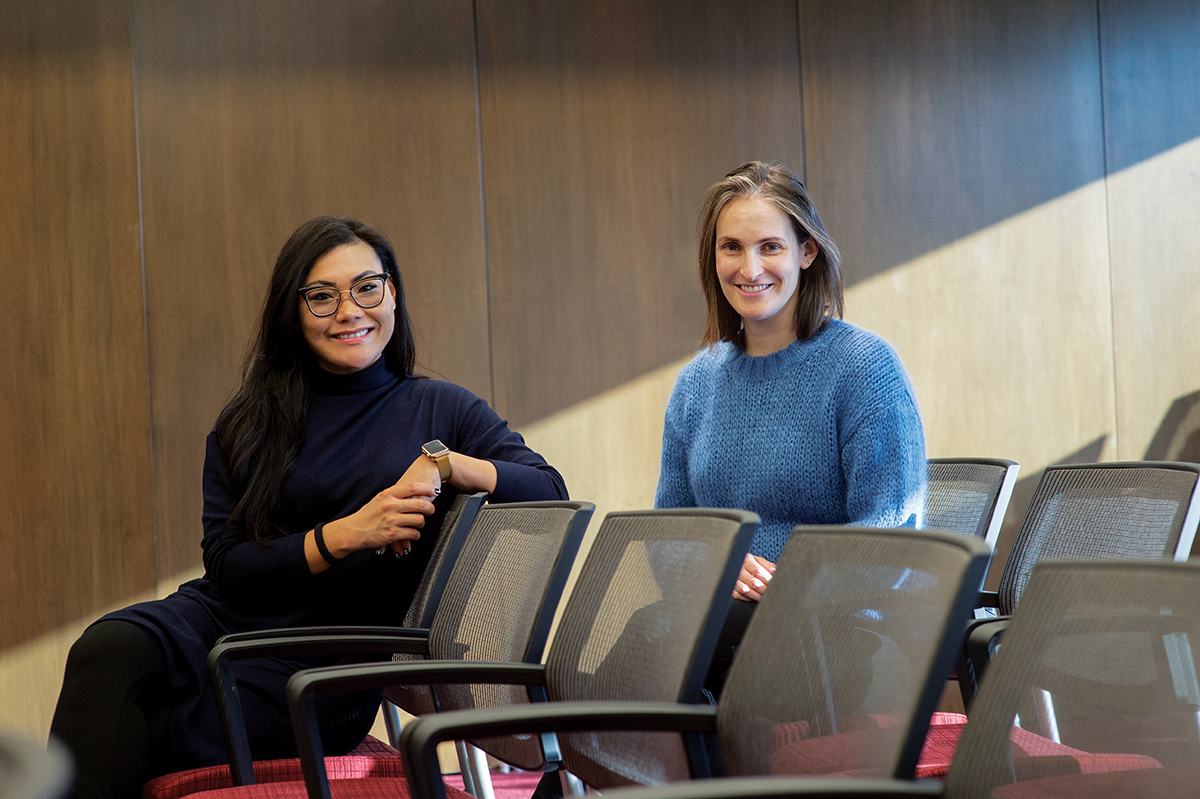
Doctoral student Jennifer Lee with her faculty mentor, Assistant Professor Alexis Pozen.
Earning a doctorate can be grueling, as CUNY SPH doctoral student Jennifer Lee will attest. Students juggle coursework, research, and crafting their dissertations often whilst navigating the most momentous years of their career.
A good faculty mentor may steer a student towards the successful completion of their degree. An exceptional faculty mentor helps the student realize their full potential in the academic sphere and beyond. Dr. Alexis Pozen is known to be one of them.
Pozen, Assistant Professor of Health Policy and Management, enabled Lee to surmount the academic and personal challenges she encountered on the road to completing her doctor of public health degree.
As Lee’s dissertation committee chair, Pozen has been a tireless ally for Lee, both in the classroom and in real world settings where research and life intersect.
“I’ve gone through personal things during school and she was always there for me,” Lee explains. “She goes above the call of duty. That is so meaningful and impactful for my training at CUNY SPH.”
Lee’s doctoral work centers on the house ball community—an underground subculture that offers a gender non-conforming, sexually expansive space welcoming of some of the most marginalized members of the LGBTQ community. The community comprises alternative family-like units of appointed mother and father-figures who head houses of members referred to as “children.” The parental figures help the children overcome the physical and mental health consequences of the marginalization LGBTQ individuals often face, such as societal stigma, discrimination, and denial of civil and human rights.
“I want to look for opportunities for home-grown intra-ventions—initiatives grown organically from within the community,” says Lee describing the goal of her research. “My work is really rooted in social justice and human rights work.”
Lee credits Pozen’s rigor and teaching style with enhancing the quantitative aspect of her research.
“She’s helped me develop my consciousness and understanding of public health, specifically with quantitative tools and my ability to build on and really interpret and critique methods in health services research.”
Lee, who identifies as a member of the house ball community, says Pozen’s support helped ground her when she felt unsure about conducting research so close to home.
“How do I find someone at my school who is able to understand the nuances of my community?” Lee wondered.
Pozen’s ability to connect with her students beyond her role as an academic advisor has fostered the kind of mentor-mentee relationship that has allowed Lee to benefit from her guidance and flourish as Lee launches her own academic career.
“She has truly had a tremendous impact on my knowledge, my skills, my confidence, and my ability to conduct research on my own,” says Lee. “She shows up outside of the academic space. She came to a ball to support me and to understand me, what I am doing, and my community.”
Pozen, who has been teaching at CUNY since 2014, serves as the methodological expert in quantitative training on Lee’s dissertation committee, but her understanding of the needs of her mentees goes beyond the technical. She says graduate students are great to work with because they are self-motivated.
“They are not just here to get a degree, they are here to do interesting research and really move the public health field forward,” Pozen says.
Lee says Pozen has been essential in navigating the challenges life throws her way, helping encourage and support her.
“With her support I have been able to focus on the things that drive me as a researcher,” she says. “She has allowed me to grow as an academic and a person where I’m able to do research that matters to me and is important to my community.”










